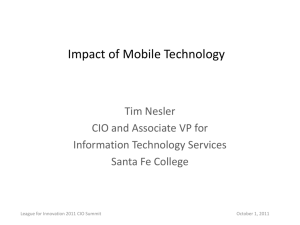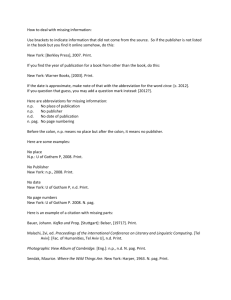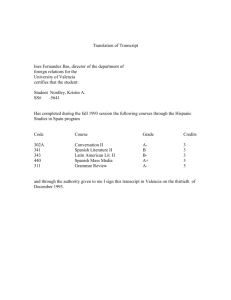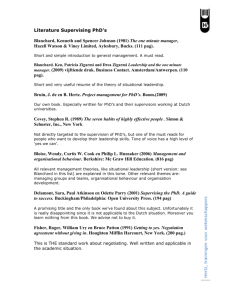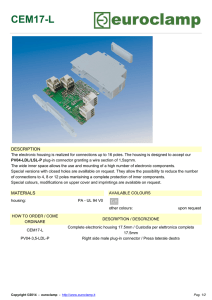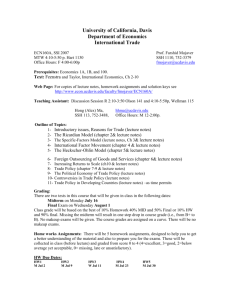Mobile Applications and Devices
advertisement
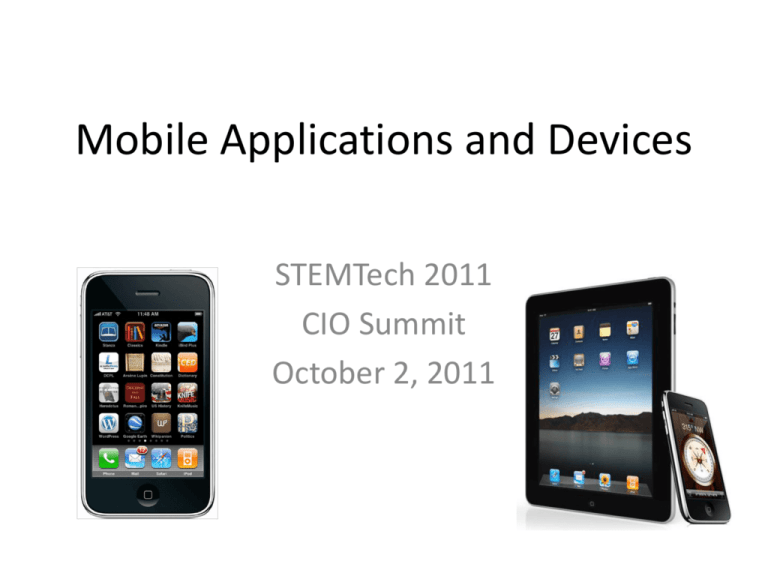
Mobile Applications and Devices STEMTech 2011 CIO Summit October 2, 2011 Some Mobile Statistics “5 billion people will be directly touched by mobile devices and networks by 2015” -- Source: Yankee Group Research, 2011 Earth’s Population Today: almost 7 billion people Mobile Device Statistics Mobile Computing is the Largest Computing Shift Ever Source: Yankee Group Research, 2011 Mobile Device Statistics Smart Phone Market Statistics Smart Phone Statistics Mobile Web Review Pros • • • • Cost and ease of development Compatibility with the most devices Control of the development and delivery process Best match with current web developer skill sets, allowing for high levels of reuse in terms of training and code base. Cons • Mobile Web applications cannot use the local device hardware, such as local storage, cameras, accelerometers, and other hardware specific features. • Mobile Web is not as “Cool” • Applications are not typically as easy to use, or as “polished” as device specific applications. • Cannot be run in an offline capacity • Often perform more slowly due to reliance on the network connection of the device Mobile Web Uses Suggested Uses: • Informational tools • Service tools • Commerce tools Non-Recommended Uses: • Games • Simulations • Offline Uses • Anything that needs to execute code locally or access the hardware directly Strategic Considerations: • Mobile Web Applications are the easiest way to enter the mobile ecosystem and leverage currently existing technologies, skill sets and reuse existing application development efforts • This methodology would allow the easiest path to deploy numerous services and tools to the largest number of end users in the shortest period of time Device Specific App Review Pros • Direct monetization of the application through an app store • Built in national level marketing such as Android or iPhone recognition or “Halo” effect • Device Specific applications typically have the best user interfaces and usability • Access to the local features of the devices such as storage, camera, and other device specific hardware Cons • Cost of development is higher than Mobile Web • Buggy software is harder to fix as it relies on the user to download updates • There can be multiple versions of device OS’s in production further increasing the number of delivery platforms that need to be supported • Reliance on externally controlled app stores for delivery to devices. App Store may include a one-time or annual fee and may have approval process before apps may be published • Applications can get lost in the Application stores with many thousands of other offerings Device Specific App Uses Suggested Uses: • Games • Simulations • Anything that relies on using the device specific hardware, such as the camera or GPS based services • Anything that must run offline • Media driven commerce (music, video, e-readers …etc) Non-Recommended Uses: • General Information • Simple Services • Traditional e-Commerce (Non media) Strategic Considerations: • The device specific applications do have more features and potentially better interfaces, but the value of the additional cost should be considered. • Mobile ecosystems (Android, iOS, Blackberry) should be evaluated to find the right fit for your business goals. Market Penetration, Monetization, Users Needs, Market Appeal …etc. • Tools like Appcelerator might ease the burden of developing for multiple platforms. Sinclair’s Mobile Offerings http://m.sinclair.edu For Students: • People Directory • College News & Events (5) • General Campus Info (6) • Sinclair FAQ’s • Schedule Planner • Program Viewer • SCC Whiteboard • Current Schedule* • Current Booklist* • My Advising Plan* • Magic Helpdesk* (4) (2) (3) (1) For Employees: • Bookstore/Student Assistance App* * Requires Authentication (#) Student Indicated Importance on Survey Mobile Development 5 Options: 1. Native Application Development 2. Mobile Application Platform Middleware 3. Mobile Pre-built Applications & Systems 4. Outsourced Mobile Application Development 5. Mobile Web Native Application Development Pros: • Complete control over application • Designed exactly to requirements Cons: • Expensive • Multiple devices and OS’s to support • Slower to market • Infrequent releases • Overwhelming maintenance Mobile Application Platform Middleware Pros: • Rapid application development • Develop once (devices supported via middleware) Cons: • Some developer learning curve • Costs • Backend system integrations may be difficult Examples: Pyxis, Appcelerator Mobile Pre-built Applications and Systems Pros: • Less expensive • Applications and integrations already built • Multiple devices supported via middleware Cons: • Less flexibility • Customizations may be more difficult Examples: Blackboard Mobile, SunGard Mobile Connection Outsourced Mobile Application Development Pros: • Build to exact specifications • Little to no in-house development needed Cons: • Expensive • Vendor dependency for changes, improvements • Little control post-release Examples: MobileZapp Mobile Web Mobile Web Pros: • Device independent (uses browser) • Develop once • Can use some native device functions • HTML 5 Cons: • Longer initial development time • More limited native device integrations (but improving) Examples: Sinclair Mobile Mobile Development Process - @ Valencia Step 1 • Extensive review of all options (5) and tools/vendors – Including demos and some pilot testing Options, Tools and Vendor Review Options, Tools and Vendor Review Options, Tools and Vendor Review Mobile Development Process - @ Valencia Step 2 (ongoing) • Review of research re: content/use • Review of other college/university apps • Student, Faculty & Staff input Mobile Development Process - @ Valencia Step 3 • Initial Tool Decision (and internal pilot) SunGard Mobile Connection • Software Cost (free) • Technology (uses same technology that Banner next release will be using) • Built in integration with Banner ERP system • Pre-built Applications • User support community Mobile Development Process - @ Valencia Step 4 (Fall 2011) • Review/feedback with MAG (Mobile Advisory Group) • Now considering “mobile web” option in parallel Step 5 (Fall 2011/Spring 2012) • Initial silent rollout – Android, Iphone/Ipod/Ipad Step 6 (Fall 2011/Spring 2012) • Feedback and review Step 7 (Spring/Summer 2012) • Marketing Announcement and Final Rollout (including Blackberry) Valencia’s Mobile Application (so far) Valencia’s Mobile Application (so far) Valencia’s Mobile Application (so far) Valencia’s Mobile Application (so far) Valencia’s Mobile Application (so far) Valencia’s Mobile Application (so far) Valencia’s Mobile Application (so far) Questions? Contact Information: Ken Moore Senior Vice President & CIO Sinclair Community College ken.moore@sinclair.edu Bill White Chief Information Officer Valencia College bwhite@valenciacollege.edu Resources Sæterås, John. "Mobile Web vs. Native Apps. Revisited." mobiletech 9 April 2010: n. pag. Web. 12 Jul 2010. <http://www.mobiletech.mobi/blog/mobile-web-vs-native-appsrevisited/11672/>. Covert, Adrian. "What Makes The Five Smartphone Platforms Different." Gizmodo 18 March 2009: n. pag. Web. 12 Jul 2010. <http://gizmodo.com/5173865/giz-explainswhat-makes-the-five-smartphone-platforms-different>. King, Michael. "Magic Quadrant for Mobile Consumer Application Platforms." Gartner G00171503. (2009): n. pag. Web. 2 Jul 2010. Jones, Nick. "What the CIO Needs to Know About Mobile-App Stores and Ecosystems." Gartner G00169623. (2009): n. pag. Web. 2 Jul 2010. Jones, Nick. "Cross-Platform Mobile Application Development Tools: Interest and Capability Expected to Grow." Gartner G00167178. (2010): n. pag. Web. 2 Jul 2010. Basso, Monica. "Social Trends Are Influencing the Adoption of Mobile and Web Technology." Gartner G00169899. (2009): n. pag. Web. 2 Jul 2010. Redman, Philip. "Hype Cycle for Wireless Devices, Software and Services, 2009." Gartner G00168675. (2009): n. pag. Web. 2 Jul 2010. Clark, William. "Critical Capabilities for Mobile Enterprise Application Platforms." Gartner G00173496. (2009): n. pag. Web. 2 Jul 2010. King, Michael. "Mobile Applications for Your Customers: Remain Calm and Know the Risks." Gartner G00169649. (2009): n. pag. Web. 2 Jul 2010. Jones, Nick. "The Case for and Against Device-Specific Mobile Applications." Gartner G00160659. (2008): n. pag. Web. 2 Jul 2010. Shen, Sandy. "Hype Cycle for Consumer Mobile Applications, 2009." Gartner G00168324. (2009): n. pag. Web. 2 Jul 2010. Jones, Nick. "Ten Mobile Technologies to Watch in 2010 and 2011." Gartner G00174123. (2010): n. pag. Web. 2 Jul 2010. MacManus, Richard. "Mobile App or Browser-Based Site? Report Says The Browser Will Win on Mobile." Read Write Web 2 Feb 2010: n. pag. Web. 1 Jul 2010. <http://www.readwriteweb.com/archives/mobile_app_or_browser-based_site.php>. Cameron, Chris. "Will Mobile Web Apps Eventually Replace Native Apps?." Read Write Web 5 Jul 2010: n. pag. Web. 2 Jul 2010. <http://www.readwriteweb.com/archives/will_mobile_web_apps_eventually_replace_native_apps.php>. Nakao, Kevin. "Why You May Not Need a Mobile App." Mashable Jun 2010: n. pag. Web. 2 Jul 2010. <http://mashable.com/2010/06/10/why-you-may-not-needa-mobile-app/>.
